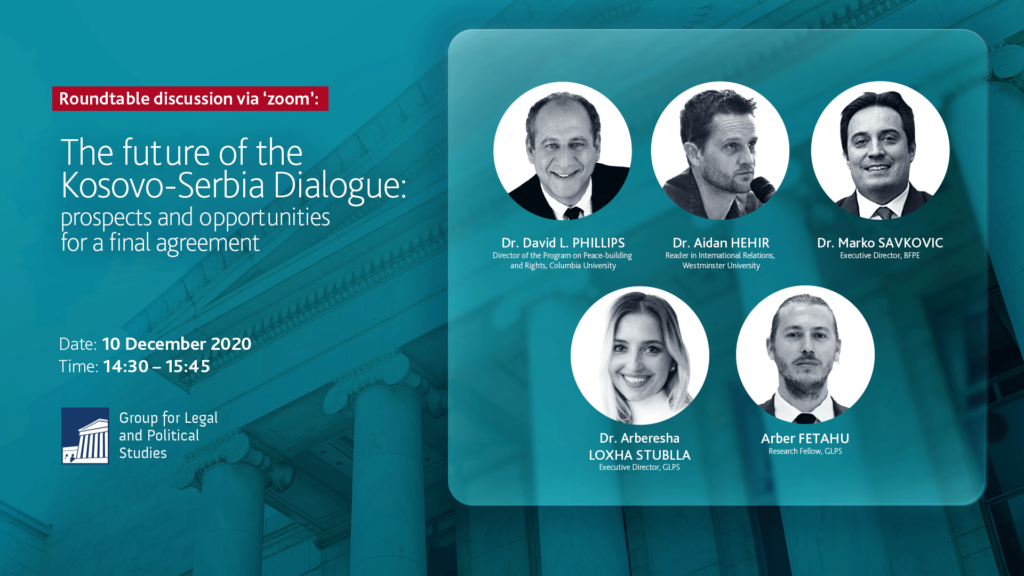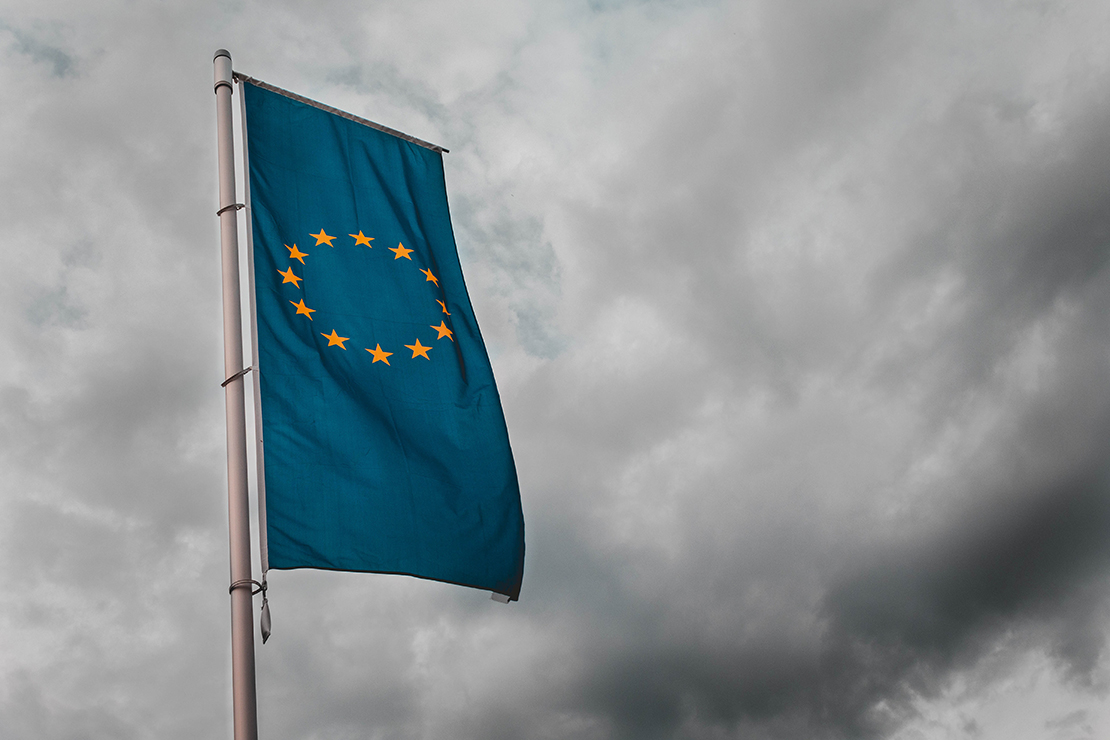On December 10, Group for Legal and Political Studies (GLPS) organized a Roundtable Discussion on the topic: “The Future of the Kosovo-Serbia Dialogue: prospects and opportunities for a final agreement”, held via Zoom. The dialogue has featured everything imaginable: from changes in delegations, renewals of EU High Representatives and mediators, to the emergence of topics such as potential border corrections between Kosovo and Serbia, the establishment of an Association of Serbian Municipalities (ASM) in Kosovo—all against the backdrop of EU integration. Therefore, this virtual discussion aimed to shed light in some of the crucial issues of the dialogue such as the case of the Association of Serbian Municipalities, the possibilities for a final agreement, and the possibility of changing the course of the dialogue after the change of administration in the United States. In all, this discussion aimed to deconstruct the dialogue in Brussels, taking into account the frequent changes in its course.
“About Washington Agreement, I must say there was no agreement. The so-called Washington Agreement was a piece of paper which was signed by both parties, which committed the parties to take certain steps. This agreement it looked much more like a Trump’s campaign stunt, rather than mediation or a diplomatic effort. The agreement itself has no reciprocity and no mutual commitments. It focuses in economic cooperation, and the ‘Washington Agreement’ is pro-Serbian and it endorses road and rail transport as well as access to Adriatic, which mostly helps the Serbian products.’ stated Dr. Philips in his first addressing to the audience.
Furthermore, Dr. Phillips, throughout his analysis and discussion mentioned the formation of the Association of Serbian Municipalities – ASM.
“I know that the ASM is a flashpoint to debate and discussion, and I hear repeatedly that the ASM would be acceptable if it did not have executive powers. I am not sure if I understand what executive powers means, those should be defined if the ASM is going to be on the table we need to know what’s involved. In my opinion ASM is redundant. The Government of Kosovo should accept the ASM based on the following principles: no actions should be taken if it makes the state of Kosovo unfunctional or disadvantaged; ASM should be aligned with the constitution of Kosovo and the principles, and regulations of local government; it should improve the lives of Serbs; the ASM should not involve local control of the police or the judiciary functions; it should have no powers over urban and spatial developments, and accepting the ASM by the Government of Kosovo should be linked with the recognition by the 5 non-EU recognizers, and membership in International Organizations for Kosovo.”
Mr. Phillips expects a different approach from the Biden’s Administration, and in his view, there is a need for a draft proposal that addresses the core problem, which is the recognition.
When asked about the potential for an agreement between Kosovo and Serbia, Dr. Aidan Hehir summarized his view: “About the potential of having an agreement, I think yes, there could be an agreement but whether would be of any substance would be a different matter. However, we should look the international politics in relation to the dialogue. The west is losing cohesion, the EU is not what it was because of BREXIT and other issues, the United States is significantly going through internal disruptions. As a cohesive actor the west has lost a huge amount of power, and obviously other powers have moved most notably the Russia and China particularly. In terms of the dialogue, the idea of normalization seems to me nothing, I am not quite sure what it means in practice, and obviously it does not mean recognition. Who gains from this dialogue, what interests are at stake? For the EU there are three major motivations; first is to demonstrate that we are better than the US, we do not want to be left out of the loop; second the EU wants to encounter the Russian influence in the Balkans, keeping it away from Serbia; the third issue wants to demonstrate its utility.

Mr. Hehir had his reservations about upcoming Biden’s Administration in the light of the process of the dialogue.
In the question of how Belgrade anticipates the continuation of the dialogue, Dr. Marko Savkovic explained: “Belgrade has moved on from the idea of border correction, which it hinted up the opportunity the recognition two years ago. This was clear on the fall of 2018 and in February 2019 Mr. Dacic went and said that ‘Razgranicenje’ was the official policy. If the dialogue in the Brussels fails border corrections will be surface as an idea in a couple of years. In the end there will have to be a demarcation, so borders will be an issue. Belgrade approach right now it seems to be to wait because the other side at the moment seems more dysfunctional. On the role played from the outgoing Trump Administration, it seems to me that once they saw that the political settlement is not to be found or explored, they quickly reoriented toward the economic one, and their idea was to move to another important issue, which the control over resources.”
Dr. Arberesha Loxha said that the outcomes of the dialogue over the years were vague. “The tone of the negotiations was acrimonious and the talks often were accompanied by refusal from negotiating parties. There are few important points as we as GLPS believe to be considered. First, is very important that the dialogue to be followed with coherence by the US administration and the EU; second, we consider that is important in our beliefs that the negotiator or the chief negotiator are not amongst skeptics of Kosovo independence, and also, we really wish that in the future will not be asked for the constitutional changes that will harm the constitutionality”, she stated.
“We believe that the dialogue should continue, but red lines should be drawn. One of them should be that the dialogue cannot only be based in the real political meaning that the stronger will get more, and this was brought by Trump Administration, and if it was to continue, we believe would increase the Russian influence in the Balkans. Furthermore, the EU should agree on other lines, meaning that liberal values of Western atmosphere should presume; there should be no territory for peace, and the issue of territorial swaps should be off the table; multiethnic institutions; no division of ethnicities, but integration, and common life in one public umbrella, and no nationalism, but rule of law and good governance.”, she concluded.
Panelists:
Dr. David L. PHILLIPS – Director of the Program on Peace-building and Rights, Columbia University;
Dr. Aidan HEHIR – Reader in International Relations, Westminster University;
Dr. Marko SAVKOVIC – Executive Director, Belgrade Fund for Political Excellence (BFPE);
Dr. Arbëresha LOXHA STUBLLA – Executive Director, Group for Legal and Political Studies.
This Roundtable Discussion was moderated by Mr. Arber FETAHU from Group for Legal and Political Studies.
Share article
Latest Publications
April 24, 2024
Policy Analysis
Tracking Kosovo's Commitment: Monitoring Adherence to the Venice Commission Rule of Law Checklist in ...
April 8, 2024
Policy Analysis
Reflecting on the Third Year of Kurti II: Setbacks and Achievements in Rule of Law, Public Administr ...
March 22, 2024
Policy Analysis
Lost, “in the Twilight Zone” Rebutting the Court’s Blunder
Related Espresso Insights
March 4, 2024
Espresso.Insights
Passport Hangover: What’s next after Spain’s Kosovo breakthrough?

January 16, 2023
Espresso.Insights
Recognized but not supported: Hungary's stance on Kosovo's EU bid





